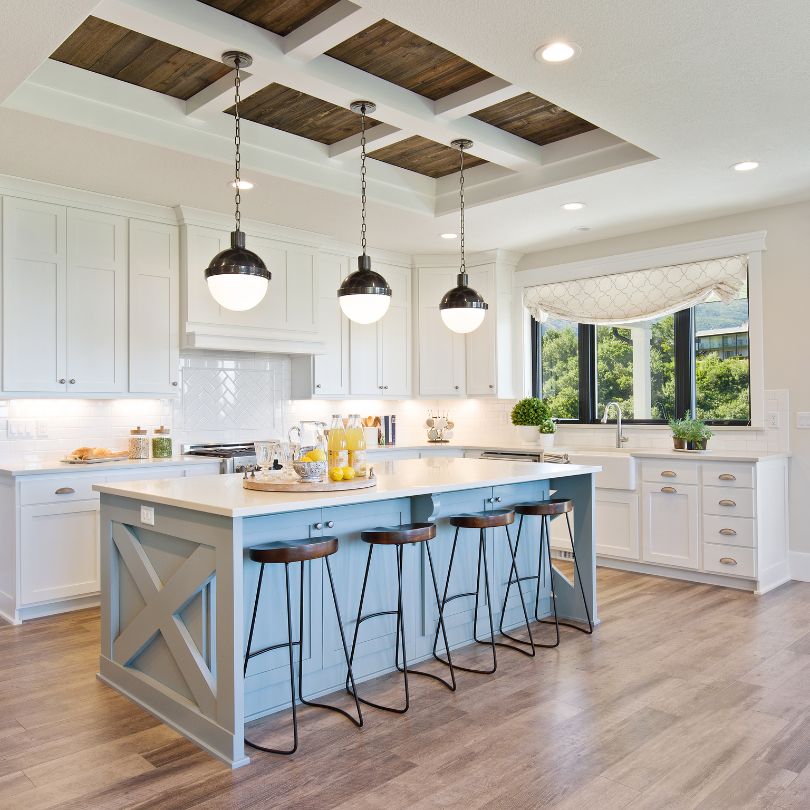
When it comes to increasing the value of your home, flooring upgrades are one of the most impactful improvements you can make. Floors form the foundation of every room, affecting your space’s aesthetics and functionality. You’ll be able to add value to your home through flooring upgrades, the types of flooring that offer the best return on investment (ROI), and the steps to make your flooring project successful.
Why Flooring Upgrades Matter
Flooring is more than just a surface to walk on—it sets the tone for your home. Old, worn-out flooring can make even the most beautifully decorated spaces look dated and unappealing. Conversely, new, high-quality flooring can enhance the overall appearance of your home, making it feel more luxurious, modern, and inviting.
Types of Flooring That Add Value
Not all flooring types are the same, and some types of flooring can add more value than others. Below are some top flooring choices that can increase your home’s value:
Hardwood Flooring
Hardwood flooring is the gold standard for adding value to a home. Its timeless appeal and durability make it a favorite among homebuyers. Here’s why hardwood flooring is an excellent investment:
- High ROI:
Hardwood floors offer one of the highest returns on investment. Depending on the type of wood and installation quality, homeowners can expect to recoup 70-90% of the costs when selling the home.
- Durability:
With good care, hardwood floors can last for many years and be sanded and refinished several times to make them look new.
- Broad Appeal:
Hardwood floors are versatile and complement various interior design styles, making them desirable for buyers.
Hardwood flooring is one of the best choices for adding significant value to your home.
Luxury Vinyl Plank (LVP)
Luxury vinyl plank (LVP) flooring has gained popularity in recent years. It’s durable, resistant, and easy to maintain. It is an intelligent option for high-traffic areas like kitchens and bathrooms, and here adds value:
- Affordability:
LVP offers a budget-friendly alternative to hardwood without sacrificing the appearance. LVP is resistant to scratches, stains, and moisture, making it ideal for homes with children and pets.
- Variety of Styles:
LVP comes in a wide range of styles, allowing homeowners to achieve a high-end look that appeals to various tastes.
Tile Flooring
Tile is another flooring option that can add value, particularly in moisture-prone areas like bathrooms, kitchens, and laundry rooms. Ceramic, porcelain, and stone tiles are famous for their durability and timeless appeal. Tile floors are:
- Low Maintenance:
Tile floors are simple to clean and will be protected from stains or scratches.
- Long-Lasting:
Tile can last decades if properly installed, making it a durable invention. invwon’tntWith endless design possibilities, tile can add a touch of luxury and sophistication to any room.
Tile floors may provide less of a return on investment than hardwood. However, they can still be upgraded, especially when moisture concerns them.
Engineered Wood
Engineered wood is an excellent compromise, and they are offering more affordable options. Here’s why It’s suitable for adding value:
- Durability:
Engineered wood resists warping and cracking, making it suitable for areHere’se areHere’sewbasit’stsd hardwood may not perform well.
- Cost-Effective:
It’s less extensive than solid hardwood while offering a high-end look.
Carpet (in Select Areas)
While carpet may not offer the same ROI as hardwood or tile, it can still add value to your home if used strategically. Carpet is best suited for bedrooms, where comfort and warmth are a priority. A high-quality, stain-resistant rug can enhance the cozy feel of a room, making it more inviting for buyers. Carpet adds value by:
- Comfort:
A soft, plush rug creates a warm, comfortable environment, which can be a selling point in bedrooms and family rooms.
- Affordability:
Carpet is one of the more affordable flooring options, making it a cost-effective way to update specific areas of your home.
How to Choose the Right Flooring for Your Home
Choosing the right flooring depends on several factors, including the room’s budget and style preferences. Here are some key considerations:
- Room Usage:
High-traffic areas like hallways and floorings like hardwood or tile, while bedrooms can benefit from the comfort of carpet.
- Climate:
If you live in a humid area, consider flooring options like tile or engineered wood that can handle moisture better than solid hardwood.
- Budget:
Set a budget and explore materials that offer the best value within your price range. LVP and engineered wood are excellent choices for cost-effective yet stylish flooring.
- Resale Appeal:
If you plan to sell your home, choose neutral flooring options that appeal to a broad range of buyers. Avoid overly bold or trendy designs that may not age well.
Conclusion
Updating your floors is one of the best ways to increase your home’s value. Whether you choose hardwood, luxury vinyl plank, tile, or engineered wood, new floors can enhance your property’s appeal, functionality, and resale value. Selecting suitable materials and hiring experts can be a wise investment to improve your home for years.
